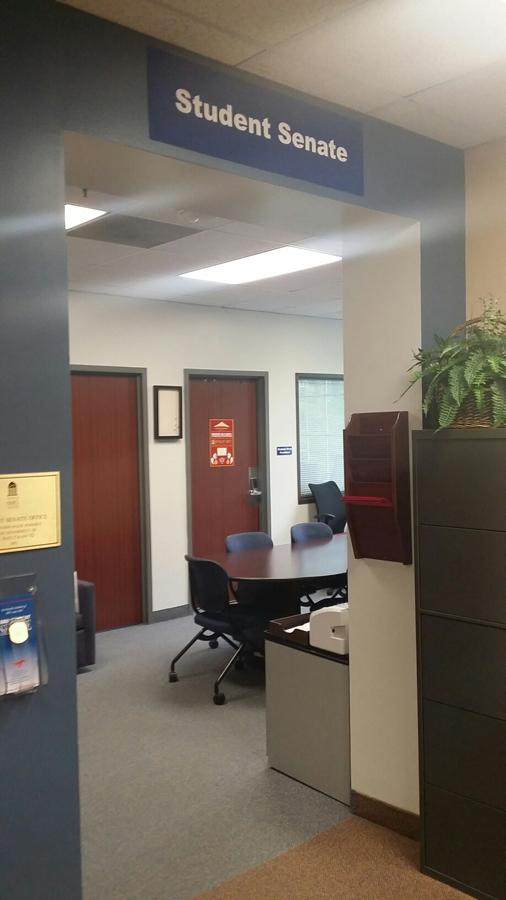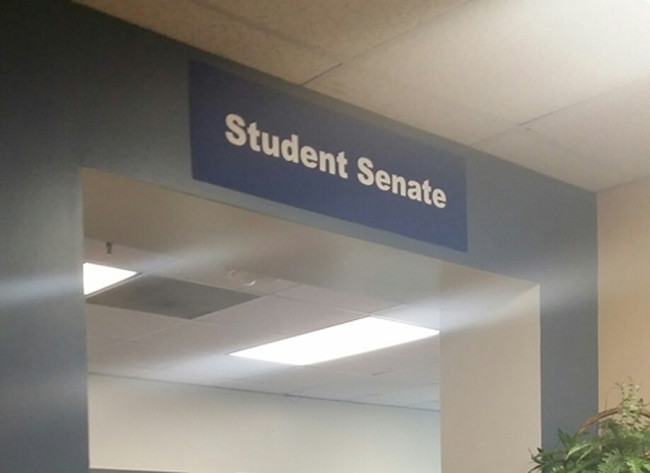
Special interest seats have been part of the Student Senate since 1976, when the school’s constitution called for an African American and Hispanic American seat. The idea of Student Senate for minorities dates back to 1925.
Today, the seats are under scrutiny. A special interest seat for LGBT students to have representation on the senate failed, with the ballot initiative only receiving 51.9 percent of the vote: almost 14 percent under the necessary two-thirds of the student body’s votes to pass the amendment.
This was the second vote on the measure in three weeks. The first vote failed, but advocates for the bill collected enough signatures for a re-vote.
Students say the debate over the LGBT seat has raised questions about the need for special interest seats in general; some are questioning the legitimacy of a second vote on the issue; others say the seat opens a Pandora’s box in terms of special interest seats.
It has also been revealed that some students, in theory, could have as many as 11 votes in an election cycle, while other students, in theory, could have only one.
“There’s clearly an over-representation which calls not only into question the LGBT seat but other special interest seats,” said Lee Downen, student senator from the Cox School of Business.
Special interest seats on the Student Senate are supposed to represent a minority that is larger than 150 students but smaller than 15 percent of the student population. Special interest seats are allotted to African American, Asian American, Hispanic American and International Students. There is also a seat representing transfer students. These five seats in the Student Senate are given to minority groups to ensure that they have a voice. The LGBT seat would have made the sixth minority seat on the senate. Only members of these groups may run for their seat.
“Do the special interest seats even do anything?”
Of the 39 bills passed by the Student Senate this year, only a handful were proposed by members of these special seats. Two special interest senators, those in the Asian American and Hispanic American seats, dropped out of their positions and were replaced.
Parliamentarian of the Student Senate, Christopher Cornell, a third-year law student, said the turnover and lack of authored bills by the special interest senators may be a part of a bigger trend of apathy in the Student Senate.
“Not to be cruel, but a lot of Student Senators don’t ever introduce anything or even speak,” he said. “It wasn’t as bad this year, but in the 99th Student Senate, it was either half or more than half of the people who were sworn in in April before the first meeting were not still senators when the 99th senate ended, which is just a huge turnover ratio and vacancy rate.”
But Student Body Vice President Jaywin Mahli insists that the special seats are an important part of the Senate.
“At the end of the day, its not just bills that a senator does,” Mahli said. “It’s [the special interest senators] up and representing their communities in debate, and bringing their communities issues to us in the senate.”
“But how do we know if a candidate is gay?”
SMU and the elections committee determine the racial background of a potential candidate through Access.smu, where students identify their racial background. The school would have determined who was eligible to vote in the LGBT elections by having students log on to the website and register as identifying with the LGBT community.
Downen, who wrote an opinion article arguing against the passage of the seat in The Daily Campus said, “There is no visual or genetic way to determine if that fact [that someone is gay] is there, because it is self-identifiable. Whereas race is very plain to see if you are a part of that group, but with sexuality, that is not the case.”
There is no way to ensure against voter fraud in any of the special interest seats elections senate officials said. Voter fraud is not unknown in SMU Student Senate history. According to Cornell, 30 years ago, an election for the Hispanic American seat was rigged.
“At some point in the early eighties, kids got the code for the [scantron form] for Hispanic senator,” he said. “Even though they weren’t Hispanic, they all voted on it and the senate had to declare the election invalid and have a re-election.”
Incoming Student Body Vice President Monica Finnegan said that, while there is no way to ensure against voter fraud, she has faith in the student body.
“I think that it is just a matter of people being honest and understanding,” she said.
“Why did we have a second vote on the referendum?”
Although a student senator saw the second LGBT vote as “slimy” because of the quick turnaround between the two votes, Vice President Mahli said it was anything but that.
“I was one of the people who pushed [the second vote], I am one of the people working in the back, so it was my decision,” Mahli said. “At the end of the day, we had to go out and get 1,053 signature, and we got upwards of 1,500 signatures. Slimy would be doing something behind the scenes that nobody knows about, and we’re doing the polar opposite.”
“One person, one vote”
One of the big issues that caused people to vote against the passage of an LGBT seat is the belief that each student at SMU should have only one vote, students and Senate officials said. As the process is now, for instance, a Hispanic student from Costa Rica who transferred into SMU and earning a major in two different schools would be eligible to vote for five separate seats. Vice President Mahli said it is not as unfair as it seems. He believes in what is known in political science as the “multicultural theory of justice.” The theory states that people’s situations are not equal to begin with, so to treat them as if they are on an equal playing field is unfair. Because of this inherent unfairness, it follows that minorities need the extra votes on the Student Senate.
“Sometimes you need to extend your hand out a little further,” Mahli said, “People may ask, ‘Well if there is an LBGT seat, then why isn’t there a straight seat?’ Well, it’s because the straight students are represented overwhelmingly, the straight students feel comfortable on this campus, and that’s not the same for LGBT community. If you’re a Straight, white, Christian male, you’re not going to have any other votes than the school you are in, but for people who don’t identify as such, I think the special interest seat holds a lot of value.”
Incoming Vice President Finnegan sees the additional votes given to specific groups differently. While she agrees with Mahli that special interest seats are useful for the community she prefers that each student have the same amount of representation.
“I lean closer to one person, one vote, however I see the merit of special interest seats,” she said.
“A Pandora’s box”
Opening the special interest seat to groups not based on race opens a Pandora’s box in the Student Senate, some students said. With the passage of the LGBT seat, other groups that are not based on race have even more precedent to be represented on the Student Senate floor.
Groups that identify with a specific religion, or any group that has more than 150 members but makes up less than 15 percent of the student body could conceivably apply for a seat.
“I think that underrepresented communities should have a voice on campus. Should they have a seat? I’m skeptical,” Finnegan said.
“If a community asks for a seat, its our duty to give it to them.”









